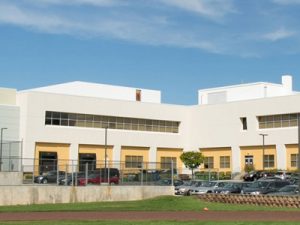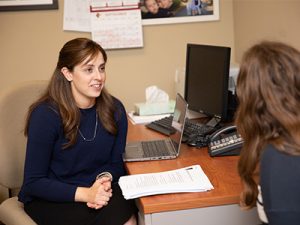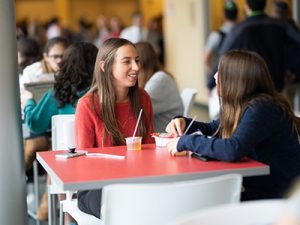History and Social Science
The History Department seeks to convey to students a sense of the complexity of the historical past and the way that people’s choices and decisions have shaped the modern world. Using a wide variety of primary and secondary sources, students are encouraged to attempt to re-experience previous eras through the eyes of people who lived through them, as well as to examine eras dispassionately through the lenses employed by historians. As students recognize the recurring themes of the human past, and thoughtfully examine the choices made by historical actors, they become more engaged and nuanced thinkers about the world they inhabit today.
9th Grade
The 9th grade history course offers an integrated approach to general and Jewish history. This allows students to understand the development of society through the ancient, classical, and medieval periods while at the same time exploring the uniqueness of the Jewish people and our heritage within the context of time and place. Students study how Jews affected and were affected by the societies in which they lived. The primary focus of the course is on the ancient Near East and Europe, but substantial time is also devoted to the great empires of the Far East and to the trade and interconnections between East and West. The course begins with prehistory and moves through the medieval period, concluding with the Renaissance.
10th Grade
The 10th grade history course is the second year of a two-year sequence covering integrated Jewish and World History. Building on the foundation they obtain in the 9th grade history course, students become equipped to understand the interconnections between events in Jewish and general history, as well as between events in disparate parts of the globe. The course begins with the Reformation and concludes with the fall of the Soviet Union. In-depth units on the Holocaust and Zionism/Medinat Yisrael help students understand the critical events of modern Jewish history within a broader historical context.
11th Grade
Frisch offers a one-year American history course, beginning with the European discovery of North America and ending with the present. The course traces the arc of American history from understanding native societies through early European settlements, the founding of the United States, and the country’s development into a global superpower. The course delves deeply into social, cultural, and political history, enabling students to think deeply about recurring themes of history and how the country they live in came to look and function the way it does today.
Junior Electives
Art History
The Art History course gives students the foundation needed to study and discuss art from all over the world, from prehistoric times to today. Its curriculum includes the study of architecture, sculpture, the pictorial arts – painting, drawing, printmaking and photography – and the craft arts. The course offers a sweeping survey of the handicrafts of mankind from ancient civilizations to the modern world. It engages students at the same level as an introductory college Art History course, developing students’ skills in visual, contextual and comparative analyses, and prepares them for the Advanced Placement Art History exam.
Civics
Civics explores the origins of the American democratic system while looking at how the Constitution embodies the values and purposes set up by the founding fathers. The structure and function of the government is analyzed on a national, state, and local level while showing how each level is interrelated, and discussing how constitutional values relate to other nations and world affairs. The course focuses on how the citizenry plays an active role in government and the importance of each citizen in society.
US Government and Politics
Students are introduced to the key political ideas, institutions, policies, interactions, roles, and behaviors that characterize the political culture of the United States. The course examines politically significant concepts and themes, through which students learn to apply disciplinary reasoning, assess causes and consequences of political events, and interpret data to develop evidence-based arguments. Students in this course are prepared for the Advanced Placement US Government exam.
12th Grade (past and current electives)
Good Works
The goal of the course is for students to understand, analyze, struggle with, and apply values and ideals that have defined the American Experiences and what it means to be an American citizen. Good Works reinforces the meaning of civics and the purpose of citizenship, identifies what distinguishes a democracy from other forms of government, examines the roles of government as outlined by the US Constitution and analyzes the reasoning behind the founding fathers’ need for separation of powers. The course explores that which has and continues to define the American Experience from a historical and Jewish perspective.
History and Memory: The Holocaust (Honors)
Students examine the history of anti-Semitism with a focus on the Holocaust and racism. Students investigate the development and implementation of racial anti-semitism in Germany and compare Nazi anti-semitism with other forms of racism and anti-semitism in Europe and America. In addition, students also explore the social construction of race, the connection between anti-semitism and anti- Zionism and the growth of neo-Nazism and racism in the world today.
History of New York City (Honors)
New York is one of the most important and influential cities in the world. In this course, students discover how a small island on America’s east coast became such a dominant metropolis. The first half of the course covers the history of the city, while the second half takes a thematic approach which includes architecture, politics, and immigration.
Speech, Press, and Religion: Understanding the First Amendment
On any given day, opening a newspaper means finding a story about the protections of the First Amendment to the United States Constitution. Though these stories involve the most contemporary of controversies, they also implicate the most traditional issues regarding the intersection between law, communication, and religion in a democratic society: the proper balance between freedom and security, the conflict between societal concerns and individual rights, and the importance of communication to self-governance and personal fulfillment. What happens when the individual’s desire to communicate conflicts with the concerns of the community, as expressed in legal regulation? Which competing religious values outweigh the value of free expression or privacy? Are some types of speech considered more worthy (and more guaranteed) than others? Does freedom of the press connote a level of protection beyond that of freedom of speech? Students explore the tension between individual expression and societal order, as revealed in legal theory and in the American courts. First Amendment issues along with legal precedents governing a series of controversies in the realms of speech, religion, and press are examined.
Representing the Past: Historiography and Historical Methods (Honors)
Historiography is not the study of history itself, but of the writings about history. It is an analysis of how historians have analyzed the past and asks questions such as, is there a pattern to how the past is written about? Can we learn anything about the past by looking at how it has been written about? Are there techniques and methods for studying the past? In this class, students examine and discuss how historians, beginning in the late middle ages and through the twenty-first century, have analyzed the past, paying special attention to their methods and techniques. Theories and methods of historical thinking are discussed including post-modernism, deconstruction, the Marxist critique, the Feminist critique, ideology and history, religion in history, history and nationalism, economic history, the Annales school, Holocaust and genocide, and others. The use of primary source materials and the mechanics of how professional historians do their job are also topics discussed.
Themes in World History (Honors)
The course presents a thematic approach to human history spanning from the dawn of man until the 21st century. Five topics are emphasized: mankind’s evolving relationship with the environment, the development and interaction of cultures, the forming of and conflicts between states, the creation and interaction of economic systems, and the development and transformation of social structures.
Environmental History
Geographical borders, or the natural boundaries of nation-states, are often the primary characteristics shaping the scope and scale of history courses. However, nature’s role in shaping history itself is most often overlooked. This class introduces students to how nature shapes and is shaped by human history. For example, students read texts by environmental historians, analyze primary sources that demonstrate the role of nature in the past, and work on their own projects in environmental history. Reinvestigating history from a perspective that includes the environment helps students not only see history differently, but also understand how the natural world figures prominently in contemporary life.
Current Events
Students gain an in-depth understanding and appreciation of the major issues of the day, with a focus on the current events that affect the student as a resident of the world, the U.S., and the tri-state area. Students follow daily news reports and examine the social, political and economic implications on a daily basis, as they make connections between current events and history.
Reacting to the Past
Students learn by taking on roles, informed by classic texts, in elaborate games set in the past; they learn skills—speaking, writing, critical thinking, problem solving, leadership, and teamwork—in order to prevail in difficult and complicated situations. Class sessions draw students into the past, promote their engagement with big ideas, and improve their intellectual and academic skills. Reacting roles, unlike those in a play, do not have a fixed script and outcome, so while students are obliged to adhere to the philosophical and intellectual beliefs of the historical figures they have been assigned to play, they must devise their own means of expressing those ideas persuasively, in papers, speeches, or other public presentations; as they pursue a course of action that will help them win the game.
20th-Century U.S. Cultural History
Through the twentieth century, American culture took on new forms and meanings, spurred by technological innovation, commerce, and institutions, and shaped by an ever-changing population. In the process, American culture became self-consciously ‘modern’—embraced, contested, repudiated, and continually redefined. This course explores the history of American culture from the 1890s to the 1990s, with a focus on the following questions: Why did culture become such an important part of American economic, social, and political life in the twentieth century? How has culture been created, understood, and mobilized by different groups in American society at different times? What have been the politics of culture over the twentieth century? Topics include the rise of ‘culture industries’ and mass entertainment, including, film, radio, and television; the growth of consumer culture; the impact of gender in such arenas as sports and fashion; the role of working-class peoples, African Americans, and immigrants in American culture; the cultural response to the Depression and World War II; and popular arts and social activism. The course emphasizes the study of primary documents—journalism, fiction, letters and diaries, music, photographs, and film— as a means of understanding the past.
Revolutions and Revolutionaries
What are revolutions, and how have they shaped governments, societies, and cultures around the world? What makes a revolution succeed, rather than dissipate or be quashed by larger forces? How have individuals – motivated by ideology, ambition, emotion – shaped the course of political upheavals in the Americas, Europe, the Middle East and East Asia? Do cultural revolutions have an impact comparable to cultural revolutions? Why might people view revolutions as “good” or “bad”? This course explores four different revolutions in depth, looking at each revolution’s roots, progression, long-term impact and legacy, as well as the main historical figures involved.
American Jewish History
In 1654, 23 Jews settled in New Amsterdam. Over the next 350 years, Jews learned to adapt to life in the New World. In this class, students take a chronological survey through Jewish history while taking some thematic detours to look into the development of different Jewish groups, the evolution of the American synagogue, and the surprising geography of Jewish America.
The History of American Freedom
America was founded on ideas and ideals of freedom and liberty, but what do they ideas actually mean? The great decisions of the Supreme Court through the generations are examined, including cases such as Marbury v. Madison (that created the ability of the Supreme Court to declare laws unconstitutional), Dred Scott v. Sandford (that denied citizenship to slaves and Native Americans), and Brown v. Board of Education (that abolished the doctrine of “Separate but Equal”). Bringing these discussions to the present day, students explore pressing issues such as the right to free speech, freedom of religion and from religion, abortion as a right of privacy, and the relationship between Federal government and the states. Students gain a rich legal-historical background that will serve them well as educated citizens and future leaders.
The Modern Jewish Experience: 18th Century Movements to 21st Century Israel Advocacy
A survey of modern Jewish history from the French Revolution to the present day, students focus on how the modern Jewish experience, beginning in the eighteenth century, has shaped the varying and often competing narratives of Zionism and Zionist thought and broader developments leading to the creation of the State of Israel. Significant attention is dedicated to understanding, unpacking, and analyzing the various arguments made in support of and against the State of Israel in order to proffer a more robust defense against common criticism made of the State. Major developments are analyzed in light of political, social, and ideological currents and trends. Emphasis is placed upon the emergence of diverse expressions of Jewish religious and secular identity. Topics include the Enlightenment and emancipation; rise of Reform Judaism; the Positive- Historical School: Neo-Orthodoxy; Haskalah; Volozhin and the Yeshiva movement; the Mussar movement; Jewish socialism; political and racial anti-semitism; migrations; Hibbat Zion and Zionism.
The History of Terrorism
A survey of mankind’s willingness to use violence as a means to affect politics, students learn about individuals and entities associated with terrorism throughout history. In particular, but not exclusively, students explore the origins, objectives and methods of groups such as the PLO, IRA, Hamas, Al Qaeda and ISIS. What constitutes terrorism is also discussed, as “one man’s terrorist is another man’s freedom fighter.”
Constructing the History of Tomorrow
The goal of this class is not to study themes, narratives, and details of past events, peoples, or places, but rather to look at our contemporary world with all of its flaws and problems and to try to envision what is possible for the future, what changes can be made, and what problems can be solved to create a more judicious world for all of its inhabitants. In this class, students work to understand and solve a single problem, a major issue that impacts millions of people on a daily basis- that problem may be how to ensure safe drinking water or how to stem the tide of human trafficking or how to solve homelessness or food shortage. The class decides what problem to tackle and during the first half of the year studies that problem from all angles – political, economic, social, cultural, and historical. During the second half of the course, students work to devise and create strategies to solve the problem, workshopping their solutions along the way in order to gain valuable feedback from classmates. Students then present their solutions to a group of experts who can help guide them in the implementation of these solutions. The objective is for students to think about how they can shape the future, how they can change the world for the better and how they can construct the history of tomorrow.
History of Fashion
Shoes, sweatshirts, hats, accessories…Every day we make choices about what we wear. How did these objects evolve into what they are today? This class explores the history of fashion. We will start the year tracing the development of objects of clothing from ancient times until today, using archaeological, textual, and artistic evidence. We will then move on to explore major fashion designers and the issues that they raise through their work. We will end the year with philosophical questions about fashion. How does clothing reflect moral issues? What does clothing say about our understanding of the human body? How does modesty play a role in fashion choices in different cultures? Throughout the year, we will tie our leaning into Jewish topics, such as the bigdei kehunah, tzniut, and the significance of Jewish clothing items in different parts of the world.
History of Israel
This course examines the emergence and evolution of the various streams Zionism (religious, political, labor, revisionist, etc.), the sophisticated development of the pre-state Yishuv, the struggle for statehood, and major events and themes in Israeli history since 1948, including immigration, defense, foreign relations, various peace processes, the relationship between religion and government, and Diaspora-Israel relations.
History Through Art (Honors)
This course combines a standard World Art History survey with an in-depth exploration of studying history through visual primary sources. We will take a closer look at the history of cultures whose primary sources are mostly their works of art, while also gaining a deeper appreciation of the larger sweep of art history from human prehistory to the current contemporary moment.
Inventing the Wheel (Honors)
Smartwatches, self-driving cars, drones, and designer genes: technology surrounds us, and may even be what defines us as human. In this course, we will explore the history of technologies, organized around central themes: communication from first languages to ChatGPT, transportation from the wheel to Tesla, architecture from Stonehenge to 3D printed homes, war machines from the spear to the atomic bomb, information from the abacus to the supercomputer. Along the way, we will consider questions of ethics, social organization, the state, and human imagination, answering the biggest question of all: where will we go next?
Research Seminar (Honors)
Students work on a year-long research project, producing papers, podcasts, videos, or online exhibitions on a topic of their choosing. They learn how to conduct research, present in a seminar format, critique other people’s work, accept constructive criticism, and produce a solid piece of original historical research.





